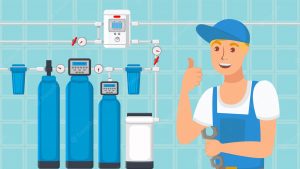Tips to Help You Prepare for Your Home Water Installation
 Installing your own home water system is a great way to reduce your monthly water bills, save money on your utilities, and save the environment at the same time. Installing a home water system also means making some important decisions about how you want to proceed. There are many things to think about before installing your own home water system. Your final decision will be influenced by a number of factors, including personal preferences, budget, etc. Read on to learn more about what it takes to install a home water system, as well as some useful tips and advice that can help you get started on this exciting project.
Installing your own home water system is a great way to reduce your monthly water bills, save money on your utilities, and save the environment at the same time. Installing a home water system also means making some important decisions about how you want to proceed. There are many things to think about before installing your own home water system. Your final decision will be influenced by a number of factors, including personal preferences, budget, etc. Read on to learn more about what it takes to install a home water system, as well as some useful tips and advice that can help you get started on this exciting project.
What Is a Home Water Installation?
A home water installation is a system that collects, stores, filters and distributes water on-site, often in a closed-loop system to reduce water waste and contamination. A home water system may consist of a water source (e.g. well), a water storage tank, a pump, filters, a pressure tank and fixtures, valves and a manifold that connects plumbing fixtures to the water system. A home water installation is often powered by solar energy, but can also be powered by electricity. Installing your own home water system can mean using a combination of off-the-shelf products or custom-designing your own water system, and installing it yourself.
Pros of Installing Your Own Water System
– Reduced monthly water bills: The most obvious pro of installing your own water system is that your monthly water bills will go down significantly. When you install your own water system, you’ll no longer be paying for water that you get from a public water source. – Saves money on your utilities: A home water system can also help you save money on your utilities. When your water comes from a public water source, you also pay a public sewerage bill. When you install your own water system, you no longer have to pay the public sewerage bill. – Saves the environment: Another advantage of installing your own water system is that you’ll be helping the environment. The more people install their own water systems, the less wastewater is sent to the public water treatment centers, and the less pollution is released into the environment. – Creates a backup water supply: A home water system can also create a backup water supply in case of emergency. Your water system can be used to supply emergency services, such as fire departments and hospitals, in case public water systems are shut down. – Saves time: A home water installation may take some time to plan, design and install, but once it’s done, it will save you a lot of time. You’ll no longer have to go to the store to buy water, or make frequent trips to public water sources. – Saves on plumbing costs: Another advantage of installing your own water system is that it can save you money on plumbing costs. If you install a water system that uses a closed-loop system, you won’t have to worry about clogging toilets and other plumbing fixtures that may be caused by sand or silt in the water supply. – Saves on upfront costs: Installing your own water system can also help you save on upfront costs. With your own water system, you won’t have to pay for monthly water service, and you won’t have to pay for monthly sewer service either.
Cons of Installing Your Own Water System
– Requires significant upfront costs: Installing a home water system requires significant upfront costs. You’ll have to pay for water plumbing materials, water hardware components and fittings, water pumps and filters, electricity equipment, and other water system components. – Requires plumbing skills: A home water installation requires plumbing skills and knowledge. You may have to hire a plumber to help you design and install your water system initially, but you will have to learn how to do this on your own eventually. – Requires a significant time commitment: Finally, you may have to make a significant time commitment to install your own water system. This can vary depending on the type of water system you plan to install, as well as your skill level. – Requires some up-front research: You can install your own water system, but you’ll have to do some research to figure out what components you need, and where you can get them. – May not be the best option for everyone: Finally, not everyone can install their own water system, or wants to. Installing a water system is not a project to take lightly. It requires significant time, skill and knowledge.
Where to Start?
When you’re about to install your own home water system, you’ll have to make a number of important decisions, such as choosing the optimal water source, calculating the appropriate water storage, and designing and installing the water pump and filters. Before you get started, it’s important to decide where you want to start with the project. The place where you start with your home water installation will likely affect your decisions on where to go next. – Decide on the type of water source you want to use: The type of water source you choose will determine a lot of other decisions in your water system. The most common types of water sources include ground water, surface water, and rainwater. You may also choose to use a combination of these sources. – Decide on the optimal water storage: The optimal water storage will depend on a number of factors, such- as the type of water source you choose, the number of people who will use the water, the amount of water you use, and the weather conditions. – Choose the optimal pump and filters for your water system: The pump and filter you choose will depend on your water source, the amount of water you need, the water storage you choose, and the weather conditions.
Budget Plan
Installing your own home water system will cost significantly less than buying water from a water company. It may even be cheaper than getting a well water testing kit. Nevertheless, installing a home water system is not a cheap project. It will cost you thousands of dollars in upfront costs, and will take a significant amount of time to complete as well. It’s important to understand the upfront costs, as well as the amount of time it’ll take to install your own water system, so that you can make smart spending decisions. It’s also important to have a budget plan. It’s recommended that you have at least $2,000 to $3,000 on hand for initial costs. You may also want to consider raising money for your water installation project by getting a loan or taking out a small business loan.
Conclusion
Installing your own home water system can be a great way to save money on your monthly water bills, utilities, and plumbing costs. It can also help you save the environment, and create a backup water supply in case of emergencies. Installing a home water system, however, requires significant upfront costs, plumbing skills, and a significant time commitment. It’s important to understand all the advantages and disadvantages of installing your own water system before you get started.
